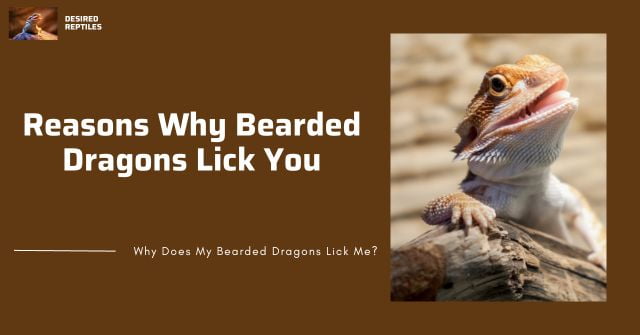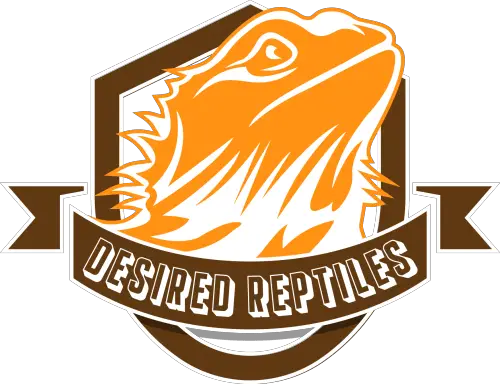Our pets can do the weirdest things out of the blue. Just when you think you’ve seen it all, your little reptile friend can decide to stick itself to the glass enclosure moving side to side and awkwardly gawking at you, or in this case, it may decide to lick you! Glass surfing, which is the awkward gawking, might be a typical sign of distress, but your bearded dragon licking you has a more interesting back story.
Your bearded dragon is licking you for mostly familiarity reasons. Beardies are intelligent animals and they can show signs of affection in quirky ways such as licking. So, if your pet dragon licks you, it’s most likely a good sign that it likes you a lot and is trying to familiarize itself with its environment!
In this article, we’d be addressing the reasons why your pet is licking you and whether or not you should be worried. Let’s go!
Should You Be Worried That Your Beardie Is Licking You?
It’s a normal response to be bothered by the strange behavior that your pet displays. It’s important to ensure that all is well before you start to give the awws and oohs. In this case, licking is nothing to bother about for most of the time; bearded dragons can do weird unpredictable things when they feel comfortable. So it is not a sign of trouble if your bearded dragon licks you. Though they may not be sociable, beauties are quite curious, too, and will act on the impulse to satisfy their curiosity.
However, if the licking is accompanied by other bothersome symptoms, then there’s a cause for alarm.

6 Good Reasons Why Your Bearded Dragon Licks You
While it may be peculiar, it’s not bad for your bearded dragon to lick you. There are a few direct reasons why your pet displays this behavior as listed below:
1. Your Beardie Is Greeting You
Bearded dragons can get over-excited and impulsively lick their owners. If you have developed a good bond with your pet, your pet may lick you when you pick it up or try to feed it as a sign of greeting. Ensure that you wash your hands after this sign of affection to reduce your chances of catching salmonella. While the situation may be cute, beardies carry this bacteria which is harmful to humans.
2. Your Beardie Is Gathering Information
Beardies have sensitive tongues and a sense of smell that can help them navigate their environment in the wild. They can pick on humidity and other chemical properties in the atmosphere by licking the surfaces of the objects around them. This usually signifies when to move from one spot to another or notify when the seasons have changed. If your pet is on a licking spree, it has probably sensed a change and is licking you to collect more information from its environment.
3. Your Beardie Is Tracing Its Food
In addition to learning about their habitat, bearded dragons use their tongues to locate small prey. They can detect slight chemical altercations in their environment linked to the presence of other organisms. You’d easily notice your pet licking the floor or the log in its enclosure to figure out if any suspicious goodies are lying around.
4. Your Beardie Is Hungry
If your pet recognizes you as its caregiver, it may come accustomed to sticking its tongue out to signify the desire for food. This especially happens when your beardie is used to getting hand fed. Take note that pets will always demand treats from you, so ensure that you don’t buy into your beardie’s charm and feed it worms every time it demands so that it doesn’t grow fat.
5. Your Beardie Is Dehydrated
Wild bearded dragons lick the rocks and leaves in their natural habitat to quench their thirst. This is because dew settles on these surfaces, and since the dragons need little water to survive, a few droplets from this rock or that leaf will take them a long way. So, if your pet is licking you, there’s every possibility that it needs water. Ensure that you provide a good water source, either by spritzing or providing a water bowl for it to drink from.
6. Your Beardie Is Marking Its Territory
Beardies leave their saliva on their favorite basking spots to signify their presence. They may also do this for shaded areas to ward off other bearded dragons from crossing paths. Your pet may lick you to chase off other beardies from resting on their favorite human or worse, take them away!
The Destructive Reasons Why Your Beardie Licks You
Bearded dragon licks may be adorable, but in a few cases, they can be symptoms of a bad situation. Beardies also act on impulse when they’re in pain or confused, which could be a direct result of the following scenarios:
Neurological Disorders
Bearded dragons can develop neurological disorders for various reasons such as genetics, blunt-force trauma to the head, vitamin or mineral deficiencies, and infections. Neurological disorders like ataxia will surely have other symptoms that sum up the conclusion, but one of the common symptoms of this disease is jaw slacking and licking.
Your pet, if sick with this problem, may lick you impulsively or mistakenly due to the inability to control their voluntary actions. It may appear with a slacked jaw or a tilted head.
The symptoms of a neurological disorder are:
- Head tilting
- Wobbling
- Slacked jaw
- Slacked tongue (which can then lead to licking)
- Aggressiveness
- Lethargy
- Loss of coordination
- Eyelid paralysis
- Loss of appetite
Metabolic Bone Disease
Bearded dragons with severe metabolic bone disease may display signs of overgrooming. This is a result of the pain and discomfort the beardie is feeling including a lack of incoherence from the disease. Beardies with severe MBD may have difficulty aligning their jaw and thus, may lick excessively at their surroundings and at the person that picks them up. Symptoms of metabolic bone disease are:
- Lethargy
- Loss of appetite
- Weakened jaw
- Limb deformities
- Difficulty breathing
- Stargazing
- Weight loss
- Overgrown scales
Is My Beardie’s Saliva Dangerous?
Bearded dragons do not have dangerous saliva. Although their saliva could be laced with several strains of bacteria that you may suffer from if your beardie licks an open wound or bites you till you cut. One of this bacterium is salmonella which is notorious for causing ‘salmonella poisoning‘ in humans, although it’s almost harmless to beardies.
You can get infected by touching your beardie’s saliva or feces and transferring the bacteria to your food. It’s highly important to clean and wash your hand properly when you handle your bearded dragon to prevent the possibility of a few ‘love licks’ turning drastic.
How Do I Know My Beardie Has Salmonella?
Bearded dragons can carry salmonella without showing any symptoms. However, this is not to say they cannot fall sick from it. If your beardie is suffering from salmonella infection, it will display symptoms like diarrhea, bloody or mucusy stool, loss of appetite, lethargy, weight loss, swollen eyelids, and a pale or rather dry look. If you notice these signs, ensure you practice strict hygiene and rush your pet to the veterinary doctor immediately.
Do Bearded Dragons Lick Other Dragons?
Beardies are not exactly the friendliest animals to their kind. It’s much easier for a dragon to bond with its caregiver than with another bearded dragon. This is because they’re quite competitive and territorial lizards. Nevertheless, in the few cases where beardies grow fond of themselves, they show signs of affection such as grooming and cuddling. So, bearded dragons do lick or groom other dragons when they feel comfortable to.
Do Bearded Dragons Lick Themselves?
It’s more unlikely for bearded dragons to lick their own self since they’re rather inflexible. Though you may catch your pet licking at its forelimbs now and then. It’s nothing serious- still the same old routine checks. Nevertheless, if you notice excessive licking and picking at the nails, it’s possibly a sign of stress and discomfort.
If the enclosure is in the correct shape and has the correct requirements for your bearded dragon, then you should take your pet to the veterinary doctor for an accurate analysis of the situation.
